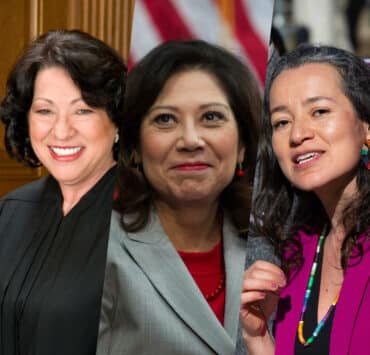|
Getting your Trinity Audio player ready...
|
The literary world has witnessed a profound renaissance, as Latino authors have emerged with powerful narratives that redefine the American story. Their works transcend borders, inviting readers to immerse themselves in the nuances of the Hispanic–Latino experience. From poignant coming-of-age tales to searing explorations of identity and belonging, these contemporary voices demand to be heard, reshaping the cultural landscape with their indelible mark.
Here’s a list of twelve contemporary Latino authors redefining the literary canon to be more diverse and inclusive in its storytelling, establishing a literary renaissance of their own.
Sandra Cisneros and The House on Mango Street
Sandra Cisneros’ seminal 1984 novel paints a vivid portrait of Esperanza Cordero, a young Latina navigating life in Chicago’s Hispanic quarter. With lyrical prose, Cisneros captures the depth of the Hispanic American experience through the eyes of a child, cementing her place as a literary icon. The House on Mango Street’s groundbreaking representation of the Chicana experience has inspired countless young Latinas to share their stories.
Junot Díaz and The Brief Wondrous Life of Oscar Wao
Junot Díaz’s Pulitzer-winning masterpiece seamlessly blends magical realism with immigrant realities. Through an unforgettable story of a Dominican American family, he explores cultural identity, masculinity, and the enduring power of love. Díaz’s rich narratives invite readers to embrace the complexities of the human condition. Furthermore, he sheds light on the unique struggles of the diaspora experience.
Julia Alvarez and How the García Girls Lost Their Accents
This beloved 1991 novel by Dominican American writer Julia Alvarez poignantly captures the struggles of cultural assimilation. Following four sisters’ journey from the Dominican Republic to New York, Alvarez deftly navigates themes of identity, family, and the immigrant experience. Alvarez’s nuanced storytelling gave voice to a generation of Latinas grappling with their multifaceted identities.
Luis Alberto Urrea and The House of Broken Angels
Luis Urrea’s 2018 novel is a sprawling, multi-generational saga of a Mexican American family’s journey. With raw honesty and lyrical prose, he explores themes of masculinity and what it means to be American in the 21st century. Urrea’s unflinching examination of the Mexican American experience has cemented his place as an essential voice in literature.
Isabel Allende and The House of the Spirits
Chilean author Isabel Allende’s debut novel is a seminal work of magical realism tracing the Trueba family’s epic story. First published in 1982, it has become a modern classic exploring the inextricable bonds of family, love, and unbreakable spirits. Allende’s pioneering work introduced the world to the richness of Latin American magical realism.
Cristina García and Dreaming in Cuban
García’s acclaimed 1992 novel weaves together the divergent dreams and realities of three generations of women from a Cuban immigrant family. With rich imagery, she illuminates the Cuban diaspora experience and the struggles of cultural identity. García’s poetic exploration of displacement and longing gave voice to a previously underrepresented community.
Héctor Tobar and The Tattooed Soldier
Through novels like The Tattooed Soldier (1998) and The Barbarian Nurseries (2011), Héctor Tobar has emerged as a powerful voice in Chicano literature. He deftly explores the Mexican American experience with unflinching honesty and keen social commentary. His narratives shed light on issues of immigration, class divides, and the pursuit of the American Dream.
Gabby Rivera and Juliet Takes a Breath
As both a writer and activist, Gabby Rivera has made noise with her groundbreaking work centering LGBTQ+ Latino characters and experiences. Her young adult novel Juliet Takes a Breath (2016) has been hailed as a trailblazing exploration of intersectional identities, capturing the complexities of coming of age as a queer Puerto Rican woman.
Valeria Luiselli and Tell Me How It Ends
Mexican author Valeria Luiselli’s genre-bending works, such as Lost Children Archive (2019) and Tell Me How It Ends (2017), seamlessly blend fiction with non-fiction. Her works offer poignant meditations on immigration, displacement, and the human condition. Luiselli’s innovative narratives have garnered critical acclaim for their lyrical prose and profound insights.
America Ferrera and American Like Me
As an acclaimed actress and activist, America Ferrera has used her platform to amplify underrepresented voices and experiences. In 2018, she edited the powerful anthology American Like Me: Reflections on Life Between Cultures. There, she helped give voice to the multifaceted narratives of immigrants and children of immigrants navigating life between cultures.
Through candid personal essays from influential figures like Lin-Manuel Miranda, Issa Rae, and Roxane Gay, the book offers a poignant exploration of cultural identity, assimilation, and belonging in America. Ferrera’s curation stems from a desire to challenge narrow definitions of the American experience and celebrate the invaluable diversity that immigrant communities bring. Her own introduction recounts her childhood grappling with dual identities as the daughter of Honduran immigrants. As such, it sets the tone for this authentic, thought-provoking collection.
Jennine Capó Crucet and Make Your Home Among Strangers
Cuban American novelist and essayist Jennine Capó Crucet offers incisive explorations of identity, race, and the immigrant experience. Her acclaimed debut How to Leave Hialeah (2009) captured the nuances of her Cuban working-class upbringing. Additionally, her novel Make Your Home Among Strangers (2015) deftly tackled issues of race and class, too.
Crucet’s 2019 essay collection My Time Among the Whites reflected candidly on her experiences. It unpacks her identity as a first-generation Latina student, examining racial bias, privilege, and evolving notions of belonging. Her fearless social commentary sparked vital conversations. It also further cemented Crucet as an essential voice giving expression to the multifaceted Latinx experience in America.
Javier Zamora and Solito
Javier Zamora’s 2022 memoir Solito has cemented his place as one of the most vital Latino literary voices to emerge in recent years. The book chronicles Zamora’s harrowing journey as a nine-year-old traveling unaccompanied from El Salvador to the United States to reunite with his parents. With vivid and poetic prose, Zamora recounts the perilous odyssey he undertook. He offers a powerful, first-hand perspective on the immigrant experience. What’s more? He gives voice to the desperation driving many to make the treacherous journey north.
Zamora’s raw, unflinching storytelling has resonated profoundly. The book garnered praise for giving voice to the struggles of undocumented immigrants and unaccompanied minors. His ability to find humanity and moments of joy amid such harsh realities has established Solito as a contemporary classic.
The Latino literary renaissance has ushered in a new era of storytelling that celebrates the diversity of the Hispanic-Latino experience. These influential authors have enriched the literary canon, challenging assumptions while fostering greater understanding across cultures. As we immerse ourselves in their powerful words, we bear witness to the transformative ability of literature. It can bridge cultural divides and inspire empathy across borders.
—
This article was written with the assistance of AI.

